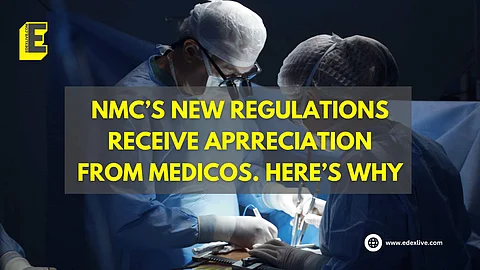

The recent regulations released by the National Medical Commission (NMC) this month, namely, the new Competency Based Medical Education (CBME) curriculum and the Minimum Standard Requirements (MSR) Gazette, have received appreciation from several sections of the medical community across India.
Medical associations have expressed that these new changes introduced by the NMC will bring a “positive and long-needed” alteration to the medical education system in India.
So what are these new regulations and how do they benefit the medical community in India?
Appointment of non-MBBS faculty
One of the major changes that NMC has introduced this month, as part of the new MRS gazette which was released on August 16, is to reduce the appointments of non-medical graduates as faculty in Indian medical colleges.
It has been a long standing demand of the medical community to ensure that only MBBS or MD graduates be considered as eligible candidates for appointment in the medical college.
A few medical associations like Indian Medical Association (IMA) and All India Pre and Para Clinical Medicos Association (AIPCMA), had even protested in July demanding necessary interventions from NMC.
Dr Anoop Singh Gurjar, General Secretary of AIPCMA said that this new move by NMC is a step toward enriching the quality of medical education in India.
“Curtailing the number and role of non-MBBS faculties in medical colleges is a very progressive step and will definitely be a historic step for the betterment and upliftment of the medical education of the country. Earlier, 30 per cent of the vacancies were for non-medical graduates in medical colleges. This has now been changed to 15 per cent, in the absence of medical persons,” said Dr Anoop in a conversation with EdexLive.
As per the previous norms, the non-MBBS, or non-medical, teachers teach pre-clinical subjects (Anatomy, Biochemistry, Physiology, Microbiology and Pharmacology) to MBBS students in the first and second years of their undergraduate course.
CBME regulations
The NMC released the Competency Based Medical Education (CBME) Curriculum Regulations 2023 on August 1, issuing several changes to the admission and academic process of medical education in India and redesigning the existing curriculum for undergraduate medical education.
Few of the highlights from the new curriculum state that universities shall organise admission timing and process in such a way that the first professional year commences by August 1 of each year from the academic year 2024-25 and there shall be no admission for any academic session beyond August 30.
The feature of the curriculum that has been especially lauded by the medical associations is the renaming of the terms pre-clinical and para-clinical to Phase I, Phase II and Phase III.
Dr Anoop Singh Gurjar, General Secretary of All India Pre and Para Clinical Medicos Association (AIPCMA), explained, “Earlier, the first year subjects were called pre-clinical, second-year subjects were called para-clinical, while third-yearyear were called clinical. Now all 21 subjects in MBBS are being identified as clinical subjects. They have been renamed by the NMC to Phase I, Phase II and Phase III.”
Several medical associations across India have written a letter to NMC and the Health Ministry acknowledging and appreciating the positive changes.
